
Topics
Guests
- Tsedale Lemmajournalist and founder of the Addis Standard, an English-language monthly magazine in Ethiopia.
An Ethiopian military bombing of a marketplace in the Tigray region killed at least 64 people in one of the deadliest attacks since government forces invaded the region last November. The bombing came just a day after Ethiopians voted in national and regional elections, but polls could not open in some areas due to ongoing fighting. The country is still waiting for results that will determine if the ruling coalition, led by Ethiopian Prime Minister Abiy Ahmed, stays in power. Thousands of people have been killed, and an estimated 2 million people have been displaced, since Ahmed ordered the Ethiopian military to invade Tigray, which is home to Ethiopia’s former governing party, the Tigray People’s Liberation Front. The invasion has led to massive food shortages, with aid groups warning 350,000 people in Tigray are on the brink of famine. “Both the famine and the bombing are not separate things from what has been happening in Tigray for the last eight months,” says Ethiopian journalist Tsedale Lemma, who says what was cast as a minor “enforcement” action has “morphed into a civil war” with no clear resolution. “The war is not ending. There is no end in sight,” says Lemma.
Transcript
AMY GOODMAN: We begin today’s show in Ethiopia, a country being torn apart by war and famine. On Tuesday, the Ethiopian military bombed a marketplace in the Tigray region, killing at least 64 people in one of the deadliest attacks since government forces invaded the region last November. The Ethiopian military has claimed all the victims were combatants, a claim disputed by witnesses on the ground.
The bombing came just a day after Ethiopians voted in national and regional elections, but polls could not open in some regions due to ongoing fighting. The country is still waiting for results, which will determine if the ruling coalition, led by the Ethiopian prime minister, Abiy Ahmed, stays in power.
The conflict in Tigray has killed thousands of civilians, displaced more than 2 million people and led to massive food shortages, with aid groups warning 350,000 people are on the brink of starvation. The United Nations is urging the Ethiopian government to allow more humanitarian aid into Tigray.
We’re joined right now by the Ethiopian journalist Tsedale Lemma. She is the founder of the Addis Standard, an English-language monthly magazine based in Ethiopia. She has a new opinion piece in The New York Times headlined “He Promised Peace. Then He Tore His Country Apart.” It’s about the Ethiopian prime minister, Abiy Ahmed, who won the 2019 Nobel Peace Prize.
So, the latest news out of Tigray, Tsedale, is two issues, is the famine it faces and this latest Ethiopian bombing of a marketplace that killed over 60 people. Can you talk about what you understand happened?
TSEDALE LEMMA: Both the famine — good morning, Amy. And thanks for having me.
Both the famine and the bombing are not separate things from what has been happening in Tigray for the last eight months, the war they begun in November, on November 4th, in what Prime Minister Abiy Ahmed said was a very short operation to apprehend members of — or, what he called the “criminal cliques” of the TPLF, which is the party that was administering the Tigray regional state. So, this operation, law enforcement operation, as it was called initially, has morphed into a civil war, which has gone into now this horrific, horrific outcome of a war that displaced, as you said, more than 2 million. Thousands are dead. We don’t know the death toll yet. The war is not ending. There is no end in sight for that. And 350,000 — more than 350,000 civilians in famine zone, according to the U.N.
So, the bombing came on top of that, which is on Tuesday. The military is saying the targets were combatants, but all information coming from the region, including reports that we filed, indicate that this was a market — airstrike on a market, and the victims are civilians, including infant children there. The army still maintains that target were combatants. And there is no explanation as to why civilians are — the pictures of civilians are emerging, if we go by the army’s interpretation of things. So, this is the cumulative effect of the war that has been going on in Tigray for eight months.
AMY GOODMAN: So, can you talk about this bombing, in particular, and the fact that the Ethiopian military has admitted that it engaged in the bombing? And what is the cause of the Ethiopian attack on Tigray and the use of Eritrean soldiers, sometimes disguised as Ethiopian soldiers, in the mass killing?
TSEDALE LEMMA: Well, this is two separate. The immediate cause of the bombing is not clear yet, but from what we get the last few days, there has been a renewed fighting between the Tigray Defense Forces, as they have now renamed themselves — these are military-armed people that belong to the Tigray regional state — and the federal forces that are backed by the Eritrean Defense Forces. So, there has been some sort of calm over the past few weeks, but there is a renewed conflict now. And officials from the Tigray — the ousted Tigray regional state government are saying they have regrouped now, and they are attacking what they call enemy posts. So there is a renewed fighting happening, which is far from the government’s assertion that the fighting is over. The government said on November 28th that the operation, the rule enforcement operation, was over already, but it didn’t. So, there is a renewed conflict.
So, we don’t know if this bombing of a marketplace has to do with the loss the Ethiopian defense forces are facing, because that’s what the Tigrayan government officials, the ones that have been ousted by the federal government, are saying, that the federal army is sustaining losses. So, what triggered it is yet to be investigated — we don’t know — and how it is that a marketplace is targeted, where civilians are the obvious casualties. So this is the background to the bombing.
But the background, the general background, to the war is inherently a political difference that morphed into a political violence and military violence. The precursor to that is an election that the Tigray regional state has unilaterally conducted in September, after the federal government decided to postpone the general election that took place this week because of the COVID reason. So, the regional state defied that, and they said they would like to have their unilateral election for the Regional Council. So they had that election in September 9th of last year.
So, relations between the two, between the federal government and the regional state in Tigray, deteriorated badly after that election took place. And in October, the Ethiopian House of Federation — the speaker of the Ethiopian upper parliament has came up with an idea that he said there is a constitutional means that we are exploring to oust the regional government that is elected by the Tigrayan people in September, and have a military intervention, a police intervention, in the region. So, relations after that was, war between the two was a matter of when, was not a matter of if.
So preparations were intensified after that. And that culminated into the war that began on the 1st of November. The federal government said it was taken by surprise. It was responding to an attack on the Northern Command Force, which is the military’s command force that was in Tigray regional state. So, federal government says that was attacked. And its response to — its military response to the regional state, that was in response to the attack against the command post that was located in the capital of the Tigray regional state. But all evidence indicates that the preparation for this war was already underway, including the involvement of the Eritrean government, because on the 1st of November, the Eritrean president has already declared — you know, released a statement, what looked like a declaration of war against the Tigrayan regional state. Now, Tigray regional state happens to be now the common enemy between the federal government, led by Abiy Ahmed, and the Eritrean dictator, Isaias Afwerki.
So, here is where we are eight months down the line — Tigray destroyed, women gang-raped — in fact, sexual assault is being used as a weapon of war, including hunger being used as a weapon of war, a lot of other sorts of war crimes being committed in Tigray regional state as we speak. So, the initial cause is that political disagreement between the federal government and the Tigray regional state.
AMY GOODMAN: You write in your New York Times op-ed piece, “He Promised Peace. Then He Tore His Country Apart,” saying, “The war in Tigray, though exceptional in its brutality, is not an isolated case.” Can you give us the history of Prime Minister Abiy Ahmed, who, amazingly, won the Nobel Peace Prize just two years ago, in 2019? Your response at the time, since you talk about this not being isolated, and what that means for today, in the midst of this election?
TSEDALE LEMMA: Yeah. So, Prime Minister Abiy Ahmed was a largely unknown figure three years ago. He came to the helm after the previous regime, which is a coalition of four major parties and five other small, periphery parties, almost collapsed under the weight of an incessant protest by the Oromo, the Amhara and also other minority groups in the southern region of the Ethiopian Federation. So, after five — four-and-a-half years of incessant protest against the previous regime, what we call the EPRDF regime, EPRDF decided that it was about time it changes leadership, it was about time it reforms itself and saves itself from the tide of the public protest. So, Prime Minister Abiy Ahmed came on the back of that protest, particularly in Oromia regional state, where the protest had first started in April of 2014. It went on until 2018, when he came. So he came to the power by the decision of the ruling party, which he then quickly dismantled after he came to power. So, this is the background of Prime Minister Abiy Ahmed.
He was a key part of the party that he dismantled, the EPRDF, the party that was dominated by the Tigray, the TPLF, which is now at war with the federal government, with the army of the federal government. And so, when he embarked upon changing or reforming that party, that was collapsing under the weight of popular protest, what he did was to implement those directions put in place by the EPRDF. One of those directions were creating — or, normalizing relations with Eritrea, the neighboring state, with which Ethiopia did not have peace or war for 20 years prior to that. So they wanted to normalize the relationship, and he got embarked on that. But instead, what he did was normalize relations between himself and the Eritrean dictator, Isaias Afwerki. The relationship between Ethiopia and Eritrea did not take any form, any institutionalized form, for that matter. In fact, the Ethiopian parliament did not even approve what kind of peace pact that the prime minister has signed with dictator Isaias Afwerki in Saudi Arabia. So we don’t know what’s included in this peace pact. So, two years down the line, Eritrea finds itself deeply involved within the war against the Tigrayan government in the north.
So, the Nobel Peace Prize was given to Prime Minister Abiy Ahmed barely a year after he initiated this normalization of relationship, about which we don’t know nothing, and the rest of the world also don’t know anything about it. But there was a lot of photobombing. There was a lot of ecstatic moments in this normalization of relations. But deep inside, it is now looking like it was a pact against the Tigrayan government in Tigray, which is neighboring the Eritrea.
Eritrea has long-standing grievances against the TPLF, because TPLF was at the helm of the regime that Prime Minister Abiy Ahmed dismantled, and during that time, Ethiopia had this two-year war, 1998-2000, in which Eritrea was defeated, and a peace agreement did not hold, because Eritrea didn’t get the land, the disputed land that was decided to Eritrea by international arbiters. Eritrea did not get that. So there is a bitter relationship between the TPLF and the Eritrean regime in Asmara. So it was a payback time for Isaias Afwerki to go and get the TPLF leadership, who have humiliated his forces in the war in ’98 to 2000.
So, this is a pact between the two, targeting a common enemy. That’s the background of the coming into power of Abiy Ahmed, which has now morphed into him being a Nobel Peace Prize winner presiding over one of the most devastating civil wars in Ethiopia.
AMY GOODMAN: On Monday, U.N. human rights chief Michelle Bachelet said she was “deeply disturbed” by continued reports of human rights violations in Tigray.
MICHELLE BACHELET: The humanitarian situation is dire, with reports of denial of humanitarian access in some localities and looting of aid supplies by soldiers. An estimated 350,000 people are threatened by famine.
AMY GOODMAN: Speaking to the BBC, Ethiopia’s Prime Minister Abiy Ahmed denied that there’s famine in Tigray.
PRIME MINISTER ABIY AHMED: There is no hunger in Tigray. There’s a problem in Tigray, and the government is capable of fixing that.
AMY GOODMAN: “There is no hunger in Tigray.” Let’s talk about that situation and the accusation by so many that aid is being blocked from getting to those in need, and the extent of the famine.
TSEDALE LEMMA: Well, you know, multiple reports from the ground, reports from humanitarian agencies, largely under the United Nations, attest to the devastating situation of the humanitarian crisis there and the number — I mean, there are people dying, as we speak, of hunger. In fact, the first report of people dying of lack of food came out in January, as far back as January, by a local authority which was instituted by the federal government. There is an interim government now that’s trying to govern Tigray regional state. So, an official of this interim government has already said 13 people have died of lack of food. That is in January. So, things have only deteriorated since January. Nothing has improved.
So, the U.N. estimates this much number are now in famine zone. And the prime minister clearly says there is no hunger in Tigray. And that’s the crux of it, the denial, the denial and the lack of humility in recognizing that people are dying, as we speak, because they cannot eat, and this lack of admitting to the role of the Eritrean forces there, who the U.N. clearly identified as culprits of forces that are deliberately denying people access to food. They are also denying farmers from plowing, because Tigray is home to the peasants. It’s a peasantry zone, and it’s a farming season now. And if they do not farm their lands now, there will be an extended famine in the region.
AMY GOODMAN: In these last —
TSEDALE LEMMA: Eritrean forces are deliberately doing that.
AMY GOODMAN: In these last 30 seconds, what can be done, Tsedale?
TSEDALE LEMMA: Well, you know, Tigray is not the only problem Ethiopia is facing today. The prime minister has massively mismanaged this transition, a once-in-a-lifetime opportunity. Oromia is also another region now which is experiencing a rebels’ movement — Benishangul regional state, Amhara regional state. They are all under some form of government crackdown, and they all trace back their differences to a political difference.
So, what we need now is to try to look into this politically and try to find a political way out of it. This, you cannot do it by jailing your opponents, dissidents, and by bombing your critics and your dissidents. You cannot do this. You can only do this by having a political solution. The prime minister thinks now he may have a mandate as an elected prime minister, but what he’s going to do after that is going to define his term in the office. Whether he will return back to the reform and have a democratic process in motion or whether he wants to continue jailing his critics, killing, and bombing the region that refused to submit to his rule. So, the only way out of this is a political solution.
AMY GOODMAN: Tsedale Lemma, I want to thank you so much for being with us, from outside Frankfurt, Germany, journalist and the founder of the Addis Standard, an English-language monthly magazine based in Ethiopia. We’ll link to her piece in The New York Times about the Ethiopian prime minister, headlined “He Promised Peace. Then He Tore His Country Apart.”
Coming up, the Afghan president is visiting the White House today as Taliban attacks surge during the U.S. military pullout. Stay with us.

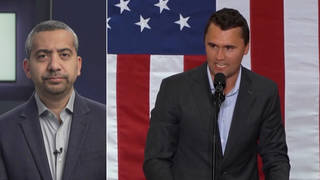
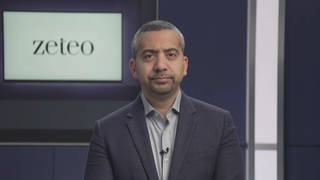
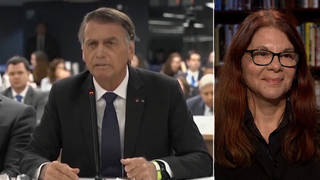
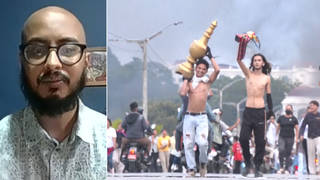





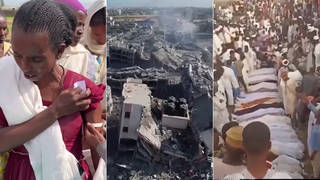

Media Options